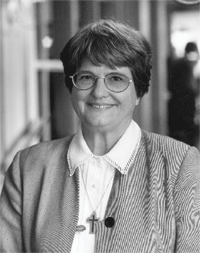“When passion is given to us it is a gift,” remarks Sister Helen Prejean as she speaks about her activism and dedication to nonviolence. She speaks with a certain calming effect, while at the same time she makes you want to rise from the crowd and speak out against injustice. People like Sister Helen, who have fought against the grain for something they believes in, are often so daunting in their accomplishments that I feel like I have so far to go in order to make a difference in the world. However, Sister Helen talks about passion as waiting to be found - anywhere, anytime. We just have to be open to it.
Many have asked Sister Helen why a nun is getting involved with murder in the first place. This question reminds me just how strongly our society is confined by categories. In our modern society everything and everyone has its place; we have clear boundaries around professions and duties. As a result, there are few people who, like Sister Helen Prejean, have redefined the familiar coniar concept of their duties and reached out beyond these boundaries. She points out that Jesus reached out to those who were in need instead of repaying hate with hate, and he stood up to the injustices of the world. She feels that following in his footsteps is certainly within the boundaries of her service as a nun. That is why she has spent over 20 years bringing awareness to what she calls “state-sanctioned murder.”
The United Nations has developed protocol with the goal to abolish the death penalty world wide, but within the U.S. thirty-eight states still have the death penalty according to the Death Penalty Information Center. When an execution occurs, Sister Helen points out, few look at it through the eyes of the mother who has to bury her child. Instead the execution of a criminal is thought of as delivering justice to the victim and his or her family. We need to ask ourselves: Does the exploitation of tragedy to excusemurder in the name of justice cease to bring about more death and suffering? The cycle of tragedy and suffering has no end in this system. The sensationalizing of the victims death only adds to the cycle of suffering instead of honoring the loss of the victim’s family. As one of the father’s of a victim told Sister Helen: “If I choose anger and bitterness they not only killed my children, but also my soul.” Unfortunately, our culture often dismisses the act of forgiveness as easy and weak, when in fact it is far easier to hate and seek empty vengeance.
When Sister Helen witnessed her first execution of a man named Patrick Sonnier, who was sentenced to death in Louisiana for rape and murder, it made her physically ill. This strong physical reaction facilitated her realization that state executions are a secret ritual hidden from the public eye, and that unless you witness it yourself or know about the procedure it is easy for this system to remain acceptable. While Sister Helen was crystallizing her realizations, she found out that eighty percent of the people in Louisiana thought it was morally permissible to carry out the death penalty in order to protect society from these criminals.
Sister Helen is most famous for her book “Dead Man Walking,” in which she wrote about Sonnier, the man on death row whom she worked with for some years. Her book was adapted to a motion picture featuring Susan Sarandon and Sean Penn, and of it has exposed millions of people to the controversial issue of the death penalty. Sister Helen wrote this book because she had witnessed this secret ritual and felt the need to share it with a society who otherwise would never know the reality of an execution. Through her interactions with Sonnier Sister Helen became aware of the many complicated issues surrounding the death penalty and the criminal justice system in the U.S. today, she has accompanied six people’s executions as the spiritual advisor. Through her work Sister Helen has brought a little light into an otherwise dark world.
For Sister Helen, her role and duty to stand against the injustices of the death penalty were not always clear. She struggled with getting her word out, but she also struggled with realizing the breadth of her duty to society as a nun. Sister Helen told a group of studentsstudents during her visit to UC Berkeley that the line that changed her life was when she heard another nun say “Jesus preached good news to the poor.” This conceptualized her calling in the community. Sister Helen now understands that following the path of Jesus, the path of forgiveness, isn’t necessarily the easy path.
To encompass this interpretation, Sister Helen felt that it meant more than working in an internal world, but uniting that world with the physical realm for an integrated spirituality. Sister Helen was also influenced by Liberation Theology, which sprung up in Latin America, highlighting the perspective of the poor for the social teaching of the Catholic Church. Bishops and nuns who adopted Liberation Theology were instrumental in helping the poor campesinos establish new lives, freeing them from dependence on a few large land-owning families. They were given help determining their own destiny. When Sister Helen speaks about social justice, not just abolishing the death penalty, it becomes clear that there is always a new road that can be forged, no matter how confining the current system appears. She encompasses the kind of creative thinking that allows for change.
Not only is passion a gift for each when it is found, but we all deserve because of our human dignity.
Death Penalty Information Center Website: http://www.deathpenaltyinfo.org/
Prejean, Helen. “Would Jesus Pull the Switch?” http://salt.claretianpubs.org/issues/deathp/prejean.html
The Official Website of Helen Prejean, CSJ http://www.prejean.org/


